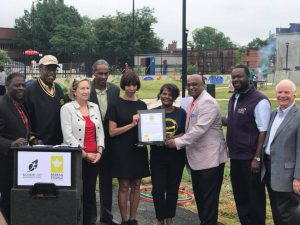A New Canvas for Baltimore: Ambrose Kennedy Park Revitalizes Recreation in Johnston Square

Assistant Secretary Carol Gilbert (third from left) celebrates the grand reopening of Ambrose Kennedy Park.
(Photo courtesy of Baltimore Mayor’s Office)
Maryland Department of Housing and Community Development Assistant Secretary Carol Gilbert recently joined residents of the Johnston Square neighborhood in east Baltimore and state, city, and community partners to celebrate the grand reopening of Ambrose Kennedy Park. Located on a 1.75-acre site at the corner of East Eager Street and Harford Avenue, the park recently completed a $1.3 million restoration, supported in part by the Baltimore Regional Neighborhood Initiative, a revitalization program administered by the Maryland Department of Housing and Community Development (DHCD). The Baltimore City Department Recreation & Parks and the Parks & People Foundation led redevelopment efforts for Ambrose Kennedy Park, and they hope its success will provide a model for the creation or preservation of future of neighborhood parks in Baltimore.
The revitalized Ambrose Kennedy Park was supported by local community organizations including the Re-Build Johnston Square Neighborhood Organization, Baltimoreans United in Leadership Development (BUILD), and the 6th Branch. The park provides green space and recreation opportunities to more than 10,000 residents who live within a 10-minute walking distance of the park, and it is also accessible to individuals with disabilities. Many of the park’s new features enhance or capitalize on its existing assets. For example, the park’s popular pool is now complemented by a state-of-the-art splash pad. Other upgrade and new amenities at Ambrose Kennedy Park include:
- Beautiful walking paths;
- Flowering shade trees;
- An open grass playing field;
- New bathrooms;
- Two new basketball courts, and
- A combination rock climbing wall and amphitheater.
Funding for this $1.3 million project included a grant from the National Recreation & Park Association with additional support from partners including the Maryland Department of Natural Resources, ReBUILD Metro, the Baltimore City Department of Housing and Community Development, and the Baltimore Gas & Electric Company. DHCD provided Baltimore Regional Neighborhood Initiative funding to help facilitate the acquisition and demolition of 18 vacant buildings to expand the park. The Initiative supports projects located in Sustainable Community Areas in Baltimore City and within the inner beltway areas of Baltimore and Anne Arundel counties. Since its creation, the Baltimore Regional Neighborhood Initiative has proven to be a flexible and effective tool for a broad variety of revitalization and redevelopment efforts.
The revitalization of Ambrose Kennedy Park contributes to the ongoing redevelopment of the Johnston Square neighborhood, including efforts to expand homeownership and a rental opportunities near Greenmount Avenue and Chase Street. DHCD has supported these activities through BRNI and Project C.O.R.E. Project C.O.R.E. – or Creating Opportunities for Renewal and Enterprise – is a multi-year initiative to demolish Baltimore’s vacant properties. Serving as the lead agency for Project C.O.R.E., DHCD estimates 4,000 blighted units will be removed through FY 2019, and, so far, the agency has provided $33 million to 65 demolition and redevelopment projects that have leveraged nearly $570 million in additional nonprofit and private sector investment in support of the revitalization of Baltimore.
“A New Canvas for Baltimore” is a regular series covering Project C.O.R.E. (Creating Opportunities for Renewal and Enterprise). Project C.O.R.E. will clear the way for new green space, new affordable and mixed use housing, and new opportunities for small business owners in Baltimore City. The initiative will generate jobs, strengthen the partnership between the City of Baltimore and the State of Maryland and lead to safer, healthier and more attractive communities. For more information on Project C.O.R.E., visit http://dhcd.maryland.gov/ProjectCORE/
